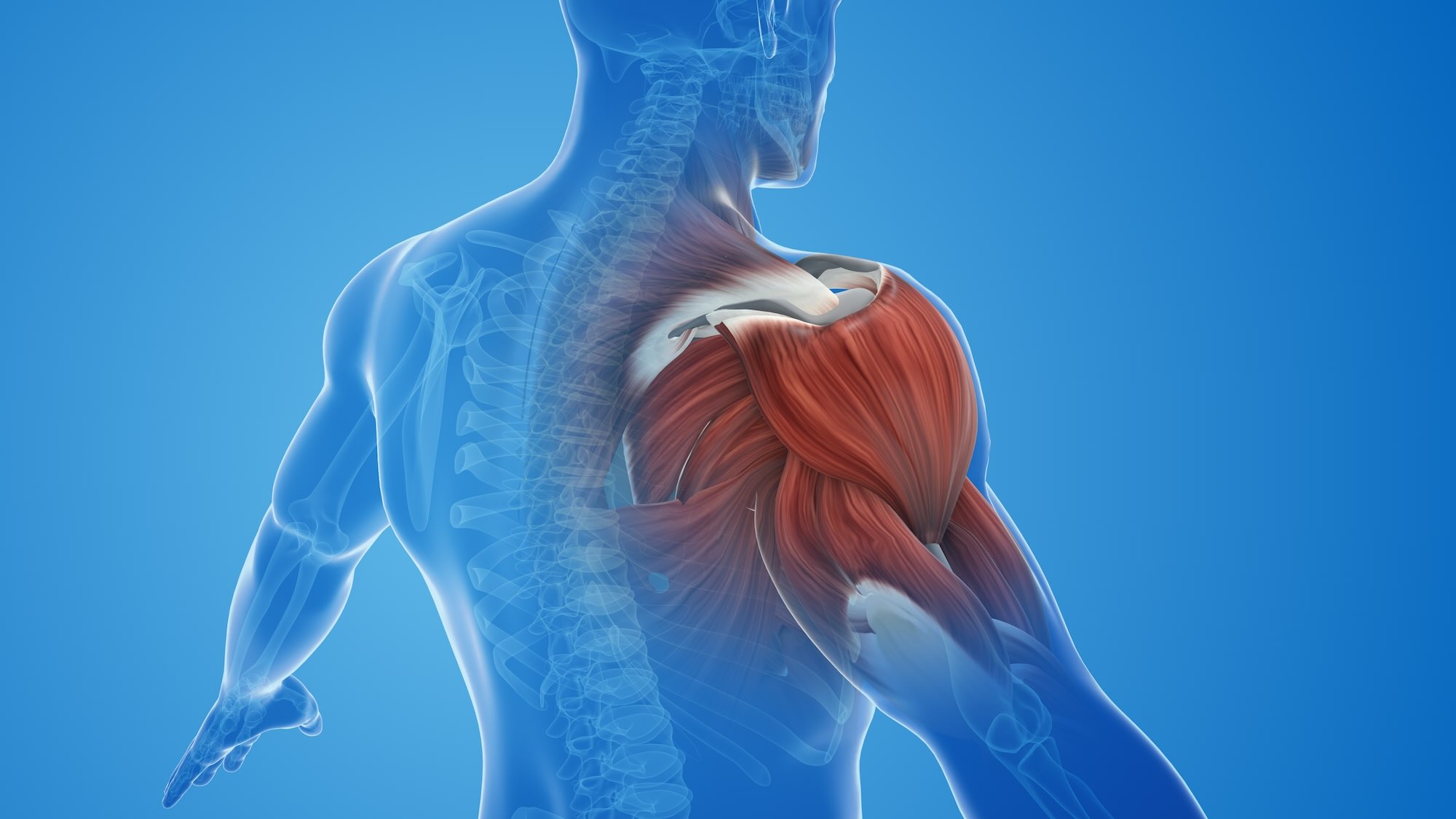If you’ve experienced a shoulder injury and are now feeling neck pain, you may wonder, “Can a shoulder injury cause neck pain?” The short answer is yes; shoulder injuries can lead to neck pain.
Known as ‘referred pain,’ discomfort can manifest in the neck due to the intricate network of nerves and muscles shared between the shoulder and neck regions.
In this post I will dive into the anatomical connections and explains how shoulder injuries can potentially result in neck pain while guiding you through diagnosis and pain management options.
Key Takeaways
- Neck and shoulder pain are often related due to shared nerve pathways and musculoskeletal connections, and discomfort in one can lead to pain in the other due to phenomena like referred pain.
- Diagnosing whether pain originates in the shoulder or neck is crucial for effective treatment, requiring a physical examination, and sometimes conditions such as rotator cuff injuries or shoulder impingement syndrome can cause neck pain.
- Conservative treatments such as heat and cold therapy, ultrasound therapy, and specific exercises may be effective for managing shoulder-induced neck pain. However, if you experience severe or persistent pain, it is important to seek medical attention and consult your orthopedic shoulder surgeon.
Understanding the Connection Between Shoulder and Neck Pain
Our bodies are a web of interconnected parts, which is very apparent in the neck and shoulder regions. When it comes to neck and shoulder pain, the two are often intertwined due to the shared nerve pathways and musculoskeletal connections. The shoulder joint, for instance, shares muscle groups with the neck, which can make it difficult to pinpoint the source of the pain. In fact, shoulder muscles share connections with the neck muscles, further complicating the issue. So, when your rotator cuff is injured, or your shoulder joint is unstable due to wear and tear, your neck might feel the pinch too, as it is closely connected to the shoulder blade.
The concept of ‘referred pain’ adds another layer to this complex issue. In essence, referred pain is a type of pain perceived in a different location than its actual source. For instance, pain originating from the shoulder could be felt in the neck, and vice versa. This is why you might experience neck pain when you’ve strained your shoulder muscles, or shoulder pain when you have a neck injury.
The Anatomy of Shoulder to Neck Pathways

At the center of this neck and shoulder connection is the cervical spine, which houses the spinal canal and the spinal cord. This structure in the neck region, consisting of seven small, highly mobile bones, ligaments, muscles, and shock-absorbing discs, connects to the shoulder. This close anatomical relationship means that trouble in the shoulder can easily spill over into the neck, and vice versa.
Referred Pain: When Your Shoulder Tricks Your Neck
Referred pain is a fascinating and sometimes frustrating phenomenon. It’s like your body playing a trick on your mind, making you feel pain in a different location from its actual source. This is particularly common in the shoulder and neck regions due to their interconnected anatomy. For instance, pain from the acromioclavicular joint in the shoulder could manifest in the neck.
While this can be confusing, certain characteristics can help distinguish between pain originating from the shoulder and pain referred from the neck. For example, pain from a neck condition typically manifests over the trapezius muscle at the top of the shoulder, differentiating it from shoulder-derived pain that is felt over the upper arm. Moreover, unlike pain originating directly from the shoulder, pain in the shoulder resulting from a neck issue does not increase with shoulder movement, allowing the shoulder to stay mobile without intensifying the discomfort.
The Mechanics of Shoulder-Induced Neck Pain
Now that we have a basic understanding of the connection between the shoulder and the neck, let’s delve deeper into the mechanics of how a shoulder problem can lead to neck pain. There are multiple conditions and injuries that can result in shoulder-induced neck pain, including:
- Muscle strains
- Rotator cuff injuries
- Thoracic outlet syndrome
- Brachial neuritis
- Stinger injuries
among others.
Each of these conditions affects the shoulder in a different way, and consequently, their impact on the neck also varies. For instance, muscle strains in the levator scapulae and trapezius, which connect both the shoulder and the neck, can result in stiffness and pain being felt in both areas. Likewise, damage to the rotator cuff can lead to compensatory movements in other muscle groups, causing a muscle strain and resulting in pain that extends from the shoulder into the neck.
Let’s now explore two common shoulder problems that can lead to neck pain: rotator cuff tears and shoulder impingement syndrome.
Rotator Cuff Tears and Neck Discomfort
A tear in the rotator cuff, a group of muscles and tendons that stabilize the shoulder, can cause more than just shoulder pain. It can also cause neck discomfort due to compensatory movements and muscle guarding or splinting. When the rotator cuff is torn, the body often compensates by overusing other muscles, which can strain the muscles and lead to pain that radiates up to the neck, particularly in the area where the trapezius muscle is located.
Moreover, individuals with a rotator cuff tear may experience the following symptoms:
- Altering arm usage to avoid pain, leading to muscle guarding or splinting
- Muscle spasms in the shoulder and neck due to protective measures
- Discomfort caused by inflammation, resulting in a sensation of pinching that extends to the neck.
Shoulder Impingement Syndrome’s Effect on the Neck
Another shoulder condition that can lead to neck pain is shoulder impingement syndrome. This syndrome occurs when the rotator cuff tendons are compressed during shoulder movements, causing painful pinching in the shoulder. This issue can be aggravated by activities such as lifting weights. Additionally, the mechanical strain can exacerbate symptoms of cervical disc herniation, leading to referred neck pain.
Moreover, the pain from shoulder impingement syndrome can spread beyond the shoulder to cause elbow pain or discomfort in the neck due to the inflammation of the rotator cuff muscles. This condition can also lead to reduced shoulder mobility, which may result in shoulder joint instability and increased strain on the neck muscles.
Diagnosing the Source of Pain: Is It Your Shoulder or Neck?
Given the interconnectedness of the shoulder and neck, diagnosing the source of pain can be a tricky endeavor. Symptoms of shoulder and neck pain can be difficult to distinguish due to shared nerve pathways that may cause pain in one area to radiate into the other. However, understanding whether the pain originates in the shoulder, or the neck is crucial for effective treatment.
This is where a specialist comes in. A proper diagnosis begins with consulting your orthopedic shoulder surgeon who will conduct a physical exam to evaluate the pain and assess the range of motion in the affected areas. Having shoulder pain diagnosed that stems from neck issues may have several causes, one of which includes cervical radiculopathy, a condition characterized by nerve irritation caused by damage to the cervical disc.
Signs That Your Shoulder Is the Culprit
So, how do you know if the root of your discomfort lies in your shoulder? Certain signs can indicate that your shoulder is the source of the pain. For instance, activities that involve using the shoulder can alternate in intensity of neck pain depending on the specific cause of the discomfort.
Conditions like shoulder osteoarthritis, characterized by the breakdown of cartilage in the joint, can lead to nerve compression, causing the pain to extend up to the neck. Treating the primary issue of a rotator cuff injury often results in the resolution of related neck problems, indicating that the shoulder was the source of the pain.
When to Suspect a Neck Problem Instead
On the flip side, certain symptoms can point towards the neck as the primary issue. Cervical spine conditions, such as cervical herniated discs, cervical spondylosis, and cervical osteoarthritis, can cause neck pain that radiates to the shoulder due to nerve root inflammation and compression. If you’re experiencing symptoms such as:
- a dull ache in the neck joints and ligaments
- severe pain
- pins and needles
- numbness in the hand
The primary issue may be with the cervical spine rather than the shoulder. Additionally, procedures such as cervical medial branch blocks, involving injections to the nerve branches, can alleviate pain from cervical conditions, highlighting the cervical spine as the source of pain.
Managing Pain from Shoulder Injuries Affecting the Neck
While it’s crucial to seek medical attention for severe or persistent shoulder and neck pain, there are non-surgical methods you can use at home to manage the discomfort. These methods aim to alleviate the pain and inflammation related to shoulder injuries that affect the neck. However, it’s important to note that these methods are more effective when used as part of a comprehensive treatment plan under the guidance of your orthopedic shoulder surgeon.
These conservative treatments include heat and cold therapies, ultrasound therapy, and specific exercises, all of which can help reduce inflammation and manage pain. Let’s delve deeper into these treatments and how they can help manage shoulder-induced neck pain.
Conservative Treatments to Reduce Inflammation and Pain
Heat and cold treatments are commonly used to manage pain and inflammation related to shoulder and neck issues. Heat therapy helps to relax muscles and increase blood flow to the affected area, offering pain relief to the shoulder and neck. Cold therapy, on the other hand, is effective for managing acute shoulder pain, as it reduces inflammation and numbs the painful area.
Another non-surgical treatment is ultrasound therapy. This therapy uses sound waves to penetrate tissues, assisting in the reduction of pain and inflammation in the shoulder and neck regions. This form of therapy can be particularly helpful in managing chronic shoulder and neck pain.
Exercises to Strengthen Shoulder Muscles and Alleviate Neck Strain
In addition to these treatments, specific exercises can also help manage shoulder-induced neck pain. Exercises such as scapular squeezes strengthen the upper back muscles, providing better shoulder stability and potentially relieving neck pain.
By strengthening the muscles that support the shoulder and neck, you can improve your posture, reduce strain on these areas, and ultimately manage the discomfort resulting from a shoulder injury.
When to Seek Medical Attention for Shoulder and Neck Pain
While home remedies and exercises can help manage mild to moderate shoulder and neck pain, it’s important to know when to consult your orthopedic shoulder surgeon. Not all shoulder and neck pain can be effectively managed at home, and delaying medical care for severe or persistent pain can lead to worsening symptoms and potentially permanent nerve damage.
When to Consult your Orthopedic Shoulder Surgeon for Persistent Discomfort
If your shoulder and neck pain is severe, continues for several days without relief, or is persistent and worsens or interferes with sleep or daily activities, even after using over-the-counter medications and rest, it’s time to see a doctor.
It’s also crucial to seek immediate medical care if your neck pain results from an injury such as a motor vehicle accident, diving accident, or fall.
If your shoulder or neck discomfort persists despite conservative treatments, it may be time to consult an orthopedic shoulder surgeon. Orthopedic shoulder surgeons specialize in the musculoskeletal system and are well-equipped to diagnose and treat the complexities of shoulder-induced neck pain.
Summary
Due to their interconnected nature, managing pain in the shoulder and neck regions can be complex. However, recognizing the link between these areas, identifying symptoms of related conditions, and knowing when to seek medical attention can significantly aid in managing discomfort. Various conservative treatments and exercises can also help alleviate pain. It is essential to incorporate these into a comprehensive treatment plan overseen by an orthopedic surgeon specializing in shoulders to give you the best possible outcomes.
Frequently Asked Questions
Can a shoulder injury cause neck pain?
Yes, a shoulder injury can cause neck pain due to shared nerve pathways and musculoskeletal connections, leading to referred pain.
How can I tell if my neck pain is from a shoulder problem?
If your neck pain increases with shoulder movement and is felt over the upper arm, it could indicate a shoulder problem. However, it’s essential to consult a healthcare professional for an accurate diagnosis.
What non-surgical treatments can help manage shoulder-induced neck pain?
Non-surgical treatments for shoulder-induced neck pain include heat and cold therapies, ultrasound therapy, and specific exercises to strengthen the shoulder muscles and alleviate neck strain. These treatments can help manage the pain effectively.
When should I seek medical attention for shoulder and neck pain?
You should seek medical attention for shoulder and neck pain if it is severe, persists for several days without relief, worsens, or interferes with sleep or daily activities, even after using over-the-counter medications and rest. It’s important not to ignore these symptoms.





